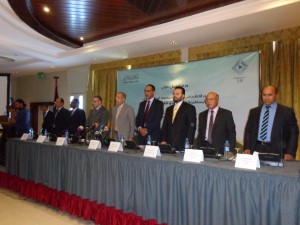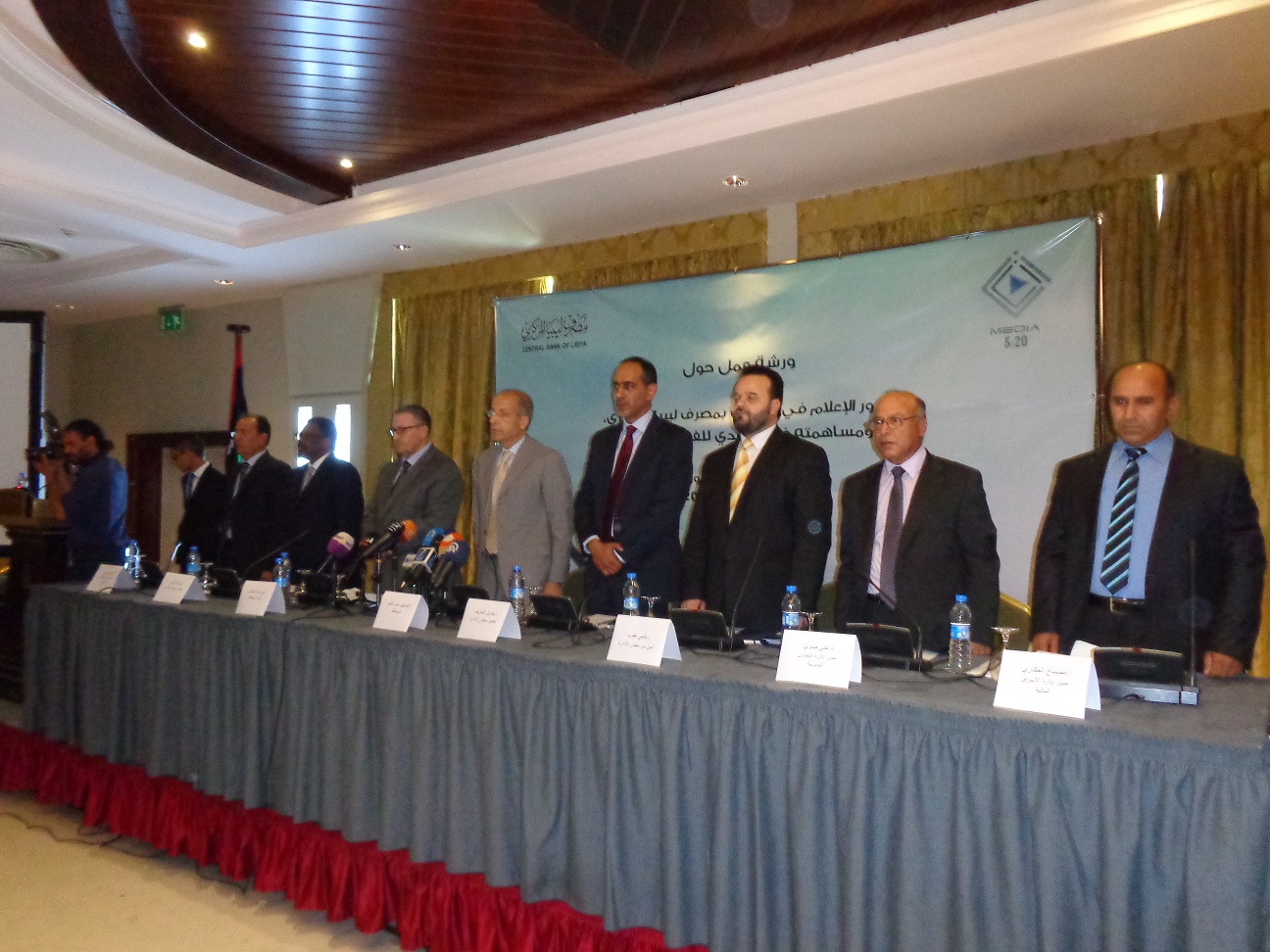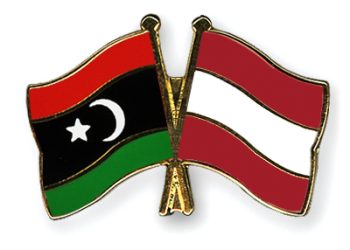By Sami Zaptia.

Tripoli, 30 May 2014:
The top brass of the Central Bank of Libya (CBL) was rolled out Thursday at an . . .[restrict]exceptional media event of interaction, outreach and transparency with the Libyan public through the media.
A hotel hall was packed with more than 70 members of the media, NGOs, business leaders, academics, accountants etc in a workshop under the banner “The Role of the media in reporting on the CBL and its role in preventing financial corruption.
There then followed an unprecedented, and at times, fascinating exercise in democracy over a two and a half hour question and answer session which at times verged on an interrogation of the CBL’s hierarchy. It was an experience that the CBL had never gone through before and as one participant pronounced to the gathered “we would have never dreamed of holding the CBL to public account like this during the previous regime”.

In an open-ended format with no preset limit on the number of questions, the Governor Saddek El Kaber, Deputy Governor Salem Hibri, the CBL board members and heads of departments sat through every question directed at them.
Breaking all the usual rules of protocol and etiquette that is usually respected in public forums, the CBL higher echelon held no punches as it indicted the legislature and executive over a series of blunders since the 17 February 2011 revolution.
In a very brief opening to the event, Governor Saddek El Kaber set the scene by explaining that the CBL needed to communicate directly with the general public through the media in view of the numerous rumours, misperceptions and miscomprehensions about the CBL’s role, activities, policies and pronouncements. The role of the CBL had been politicized by outsiders as part of the political infighting currently taking place – a politicized role it does not seek.
Libya not worse than Lebanon
With regards to the role of the CBL, it was the “last line of defence in the Libyan state” , El Kaber stated boldly. “We are going through difficult times”, he openly admitted, referring to Libya’s turbulent political scenario. However, putting things into perspective, he pointed out that other countries such as Lebanon had gone through even worse times – yet their central bank is considered “a red line”.
Better late than never
He admitted that the CBL’s reaching out to explain the reality of affairs and their point of view may have been late. “People may be asking why it took us so long to communicate with the public he said. However, he pointed out, justifying their media absence, that traditionally central banks are supposed to stay out of the media limelight.
Deputy Governor Salem Hibri for his part added that they were there “to deliver the truth to the Libyan public. There is much lack of clarity”, he said pointing to the misinformed talk about the budget for example.
“The CBL is an independent entity irrespective of any government position or policy” he said adding that it acts in cooperation with the government as its “consultant and keeper of its accounts”.
Budget deficit
With regards to Libya’s budget deficit caused by the political disruption of oil exports and aided by expansionist government spending on salaries, subsidies and operational expenses, “A deficit is dangerous when it goes over 3 percent”, explained the Deputy Governor. This is an indicator that is accepted internationally”, he pleaded for understanding from his questioners. “Therefore we try to keep it within this range. A high deficit has numerous negative effects, he explained, including the possible devaluation of the Libyan dinar”.
The Deputy Governor was at pains to explain though, that although the CBL is independent of the government, it does try to be flexible and not act as a barrier to the government and its policies.” We try to help achieve the government’s policy of development, but at the same time we try to keep a balance”.
“We are obliged to look after this balance”, he explained, adding that after all, “governments have political aims”.
The CBL added that as an institution they implement legal rulings by courts against them too, saying that they were not above the law. This was a coded response to the accusation by current caretaker Prime Minister Abdullah Thinni in April that the CBL was not cooperating with his government and that it was a law unto itself.
Payments to the thuwar (militias)
With regards to the accusation that the CBL had been implicit in the irresponsible payments made to the thuwar/militias, El-Kaber defended his institution stoutly. “We asked that the thuwar be counted prior to the payment being made out”, he explained. “But I am sorry to say that nothing happened regarding this”, he confirmed, pointing the finger of blame straight at the government.
National ID number
However, he explained that since the early payments there has been progress. The Civil Registry has created a database and a National ID number system has been created and is available for use. “It should be used”, he pleaded, “but there is no political will to use it”, he said in a damning indictment of the government and the General National Council (GNC). The CBL Governor had first made this public indictment of the Libyan government and GNC in Amman Jordan at an IMF conference in May.
Giving an example of the possible effectiveness of the use of the National ID number, CBL Governor El Kaber said that prior to adopting its use, the military had on their wage books 135,000 personnel. This fell to 104,000 after the National ID number was used to disburse wages.
“Everyone knows there is duplication of salaries but if the Ministries of lnterior and Finance enforce the National ID number it would reduce this duplication. The law for enforcement of the National ID number was passed in August 2013 and all salaries should have been paid through the it by the end of 2013. In reality only some ministries have implemented it covering about 30 percent of salary payments”, the Governor said despondently.
Bloated civil service
With regards to Libya’s huge wages section of the budget and its bloated civil service, the CBL pointed out that international standards say that no more than 8-10 percent of a country’s population should be civil servants. For Libya with a population of 6 million that should be about 600,000 civil servants. In reality, it was revealed that another 400,000 new civil servants had been appointed in the last few years bringing Libya’s total to a staggering 1.5 million civil servants. “this is too high”, the CBL Governor complained.
In keeping with this explosion in the number of government employees, the CBL explained that Libya’s salaries section of the budget has risen from around LD 9.2 bn in 2011 to about LD 23 bn in 2013.
Which PM and government did the CBL recognize?
After a couple of warm up questions, it was not long before the elephant in the room was addressed. Which Prime Minister and government did the CBL recognize? No doubt the CBL hierarchy were expecting the question, because the answer, while unconvincing to some present, as it was repeated more than once, was non-hesitant from the Governor. “We follow the law and legislation. We are now under the authority of the GNC until the 25 June elections. We are a technical institution”, he implored.
The response was not convincing. But the legitimacy of the governments and the GNC were questionable and so in such a case where did the CBL stand, came back the retort. The CBL stuck to their fine line of being tied down by “rules and laws” within their “independence” and keeping “a balance” within their duty to defend Libya’s “last line of defence”.
The CBL congratulatory letter to PM Maetig?
On the specific matter of the congratulatory letter sent by the CBL welcoming Ahmed Maetig as the newly elected Prime Minister, El Kaber said that he had received a letter from the GNC informing of Maetig’s appointment and that his letter was a courtesy letter. A welcoming and congratulatory courtesy letter, and not a letter of political support, he implied.
Ultimately, the CBL Governor admitted that the matter of the two contesting Prime Ministers was “causing us a dilemma”.
The budget: formulation, process & disbursement
The issue of the budget, how it is formulated and disbursed occupied the largest chunk of time of the media event. The CBL were very keen to educate the media and public regarding this process.
The CBL did not try to hide the fact that they regret that their input into the formulation of the budget was limited and more importantly reactive after its formulation. The Deputy Governor admitted that “the budget has not been set in a scientific manner by Libyan governments for many years We are faced with an end result of the budget and its (formulation) process – which is wrong. Our role in the budget formulation is consultative only. I hope Libya and society as a whole changes this”, he said appealing for reform.
Moreover, the CBL wished to answer the question that was not posed directly at the event. Was the CBL politically aligned to one political stream? Politically, there is a public perception that the CBL Governor is, if not a supporter, at least a sympathizer with the Libyan Islamist political movement.
The genesis of this perception was that El Kaber was appointed by the pro Islamist perceived NTC head Mustafa Abdul Jalil. Therefore, goes the popular reasoning on the street, El Kabir must be sympathetic to the Islamists – otherwise they would not have appointed him as CBL Governor.
Following this reasoning, compounded by the letter of congratulations from El Kaber to Maetig, El Kaber must be supporting the Prime Ministership of Ahmed Maetig and his government and the perceived Islamists that are supporting Maetig in the form of the Al-Wafa bloc, Justice and Construction party and Islamic Brotherhood within the GNC.
Equally, popular public perception is that given that various quarters such as the CBL and the Audit Bureau and the ever-increasing size of Libya’s budget, the huge uncontrolled payouts to militias, including extremist Islamist militias as well as the robbery of bank money by a perceived Islamist militia in Sirte – the CBL insistence in supporting the Maetig government must be for the sole self-fulfilling purpose of passing another huge state budget to enrich the CBL’s Islamist political allies or masters.
Answering this implied accusation without specifically spelling it out at the media event, the CBL was at extreme pains to point out that a budget is always passed for a twelve month period. There is no such thing as a one, two or three month budgets. A budget is passed for a whole year – irrespective of governments or Prime Ministers, they explained.
In other words, while governments and Prime Ministers may come and go, a budget is fixed. It is passed by the legislature – whenever and if it is passed – for the duration of the year – and not for the duration of the political life of a Prime Minister or his government.
Moreover, to the implied accusation that the Islamist bloc, with the cooperation of the CBL Governor, were determined to quickly and even illegally install their man Ahmed Maetig in office so as to get their hands on the whole 2014 budget – this was a clear fallacy and miscomprehension of how the budget is disbursed, it was explained.
The annual budget is divided into twelve portions, and is paid out in twelve portions over the whole year, the CBL top brass took turns to underline to their audience. It is never paid out in one go and in full. This was impossible, they tried to explain, as the Libyan budget relied overwhelming on oil revenues as and when they were received month by month. The budget relied on Libya’s monthly oil revenues so that it could be paid out proportionately on a monthly bases.
It therefore follows, the CBL explained, that if any government was only in office for a month, it would only ever have access to one month’s amount (a twelfth) of the budget.
Moreover, in view of the political embargo of Libya’s oil exports and therefore its hugely decreased oil revenues, in reality in the current situation only the salaries and the fuel subsidy sections would be paid out from the budget to any sitting government.
Loans or forward payments to the current government will be deducted from the 2014 budget whenever it is passed. A budget must be passed – again for whichever Prime Minister or government of whatever political leaning – as “the people cannot be left without their salaries. Even if we had no government and no Prime Minister at all – we cannot stop wages and subsidies” El Kaber explained desperately.
“No one can interfere in the budget – even the Governor cannot change the use of money allocated for one chapter to another”, it was stressed.
Corruption
Questioned on the issue of corruption and the CBL’s efforts to fight it Governor Kaber admitted “we have corruption cases on file which we have referred to the Prosecutor’s Office”. When pressed further on why the CBL had not revealed this or taken further action, the Governor said “We are not the body charged with fighting corruption”.
The CBL was at pains to point out that the fight against corruption in Libya was a fight for the whole of society. Moreover, on financial corruption, the CBL felt that the Ministry of Finance was the frontline entity. “We are not an anti corruption organization”, they reminded their inquisitors. They stressed that what efforts they have been taking have been of their own initiative against corruption and in favour of transparency.
For example, the CBL referred to their open tender for the printing of currency through which LD 98 m was saved. The CBL called upon all Ministries to give a transparent chance to all by offering transparent tendering processes.
Big Corruption
Deputy Governor Hibri said that “the biggest corruption takes part in three main areas: contracts, customs and taxes. The distribution of revenues and its quality should be the responsibility of the Ministry of Finance”, he insisted. For example, he pointed out that customs revenues were down to as low as LD 140 m. This should be in reality in the region of LD 1-2 bn in view of Libya’s wages, imports etc. This indicates that the correct customs duties were not being charged by the Customs officials (part of the Ministry of Finance) at Libya’s entry points.
“We spend 70 percent of our time at the CBL overseeing payments. This is not and should not be our main role or job”, he complained
Overseas assets
With regards to questions on the CBL’s overseas assets, Musbah Akkari, Chairman of Gumhuriya Bank and head of the CBL Reserves Department said that the overseas assets were valued at US$ 107 bn on 17 December 2011. Today he said they are valued at US$ 111 bn. “We provide regular reports on this”, he explained and assured that the assets are in good order.
On the debate that ensued regarding whether it was the correct decision to unfreeze the CBL’s overseas assets, the CBL said that this was a correct decision in view of the positive effect this had on the Libyan economy.
Libya’s gold reserves
Asked to reveal Libya’s gold reserves, Akkari said Libya had 143 tons of gold pre 2011 but that these stood at 116 tons today valued at about US$ 5 bn. When pressed to account for the missing 27 tons, Akkari revealed that they were sold by the Qaddafi regime during the 17th February Revolution. He also revealed that there is an investigation into the process of this sale.
Spate of bank robberies and cash in transit
To the series of questions regarding the spate of armed bank robberies and armed robberies of cash in transit, the resultant liquidity crises and bank closures, El Kaber said the problem was not a liquidity problem, but a logistics and security problem.
The CBL revealed that the increased bank robbers and interception of bank cash transfers on the roads was having a real cost on its operations. The insurance cost of transporting money from Tripoli’s city centre Maetiga airport to the CBL had increased to US$ 2.5 million, for example.
With regards to the recent decision by Sirte Local Council (SLC) to close all its banks after numerous bank robberies, El Kaber said he was surprised that the SLC chose to punish its citizens by closing banks, instead of helping prevent the problem by providing security. “We need help and have asked the government for help, but there has been no response”, he revealed.
It will be recalled that the Sirte robbery of bank cash in transit on 28 October 2013 of LD 53 million attracted much speculation, paranoia and loss of confidence in the GNC, government, political parties and militias. Troops were sent by the government who successfully located and surrounded the robbers. However, the case went cold and eventually it was announced that the robbers had escaped. The incident lost a lot of public faith in the CBL who they felt shared the blame for the loss of the Sirte money. Political collusion was suspected by the average man on the streets.
On Wednesday the CBL reduced bank opening hours in response to the worsening security situation and increased bank robberies.
El Kabir, commenting and exposing details in public about the incident revealed that the then Prime Minister had instructed the Minister of Interior to move against the Sirte bank robbers, but that in reality there had been no response from the government until the present day.
The CBL said that they are trying hard to encourage Libyans to start using credit cards more widely and move away from cash transactions. He revealed that, for example, about LD 35 m is usually dispatched to Sirte every month.
Gumhuriya bank chairman and head of CBL Reserves Musbah Akkari defended criticism that his bank suffered the most bank robberies. He said that his bank had the most branches in Libya (160) and the largest market share (45 percent). He again hoped Libyan society could move away from cash to credit transactions. Akkari pointed out that 200,000 students are now using pre-paid cards and that most banks issue credit cards with credit from US$ 500-15,000.
Foreign currency distribution to banks
The CBL delivers a set amount of foreign currency, overwhelmingly US dollars and Euros to all banks in Libya. In theory the banks are supposed to sell the currencies at the official exchange rate to the public. However, in reality corrupt staff at banks horde the currency, pretend it has been sold out or sell it to their partners in crime at the marked-up black market rate thereby earning a handsome profit.
At the press conference the CBL were asked what actions were they taking to counter this phenomenon – in view of the fact that they admitted they knew it existed.
El Kaber said that he had set up a special unit within his office to monitor currency distribution to banks. He admitted that they suspect that there was a network of people within banks and security personnel racketeering in currency. But again reminded his audience that the CBL was not a crime fighting agency. If they have suspicions or evidence, they pass it on to the Prosecutor’s Office.
LD devaluation?
Asked about the CBL policy on the possibility of devaluating the Libyan Dinar to the golden age of when LD 0.30 equaled one US dollar, Deputy Governor Hibri said that if Libya set its exchange rate with the dollar based on its non-hydrocarbon GDP, the exchange rate would be something like that of the Egyptian pound at five or six dinars per dollar.
On the other hand, if it is based on hydrocarbon GDP on the model that Kuwait follows, it would be a higher exchange rate in favour of the LD. However, he points out that the “World Bank and IMF say that this is the worse model for Libya to follow. If we devalue the exchange rate now it would affect our reserves and it would be a fatal blow to the nation and its economy”, he stressed.
Islamic banking
On the matter of Libya converting to Islamic banking, the CBL said that it had made its position clear to the GNC at the time of the passage of the law. The CBL felt that Libya has poor infrastructure, institutions, technology, knowhow and HR that were not ready for operation by 2015.
They pointed out that Malaysia took 10 years to implement Islamic banking. The CBL was in favour of phased introduction of Islamic banking, they explained, but accepted that the introduction of Islamic banking to be implemented by 2015 was a legislative decision. The CBL was working seriously to introduce Islamic banking into Libya. Five banks have been given licences to operate Islamic banking in Libya within 6 months or their licences will be reviewed, the CBL revealed.
Seeking a new economic vision
In conclusion and in view of what was said during the event, he CBL called for a new economic vision for Libya. The continuous increase in spending on wages and subsidies in the state budget financed by hydrocarbon revenues could cause a serious problem for Libya, the CBL explained.
A national revenue based on world crude oil prices, a factor that fluctuates and is outside the control of the Libyan authorities puts the whole economy and country at risk. This is compounded by the current fall in oil revenues due to the political and industrial blockades of oil exports. The current earnings barely cover the first two chapters of the budget consisting of wages and subsidies, the CBL explained.
The CBL urged that Libya pursues sustainable economic and fiscal policies and works on creating a diversified economy with alternative revenues to counter oil price shocks and fluctuations.
The current model of spending could lead to a serious long term lack of development in Libya. When Libya stabilizes and needs a development budget, there is a danger that there will be no money to finance development if spending on non-development sectors continues to rise at this rate, the CBL warned.
It will be recalled that the CBL Governor was due to be removed from office as the GNC had advertised for applications for his job back in July 2013 – however, the matter of his replacement has since gone quiet – with no explanation. [/restrict]










